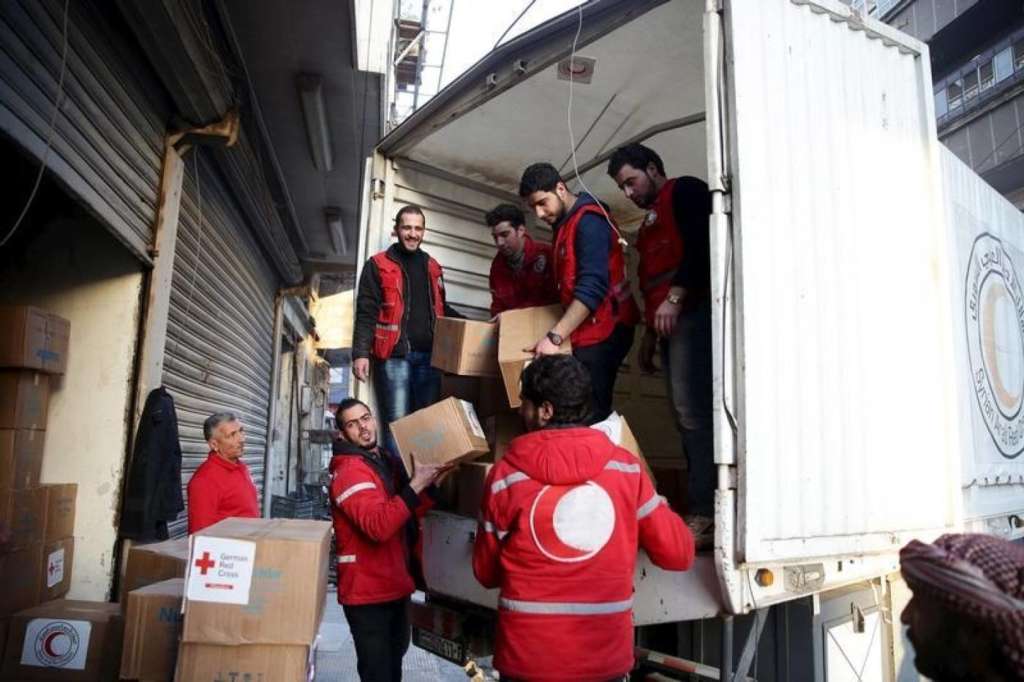Washington-Although U.S. officials said they would continue to prepare for international food delivery by air, in case the access ends, the convoys to Darayya, and to the similarly besieged city of Moadamiya, appear to have averted the latest potential escalation in Syria’s years-long civil war.
Despite that, they accomplished just little to change a situation in which maintaining the status quo now seems the most optimistic outcome in the near term, and perhaps for the remainder of Barack Obama’s presidency.
What seemed the chance of a political solution in Syria, barely three months ago; now appears an ever weaker possibility.
At the same time, those within the administration who have long advocated a more robust U.S. commitment to the Syrian opposition have largely given up.
U.S. military, intelligence and diplomatic talks with Russia, the main backer of Syrian President Bashar al-Assad, have intensified, according to several senior U.S. officials who discussed the situation but were not authorized to speak on the record.
Nevertheless, there is little optimism that the Russians are seriously interested in taking the steps required for a political settlement that the United States says will not succeed unless it results in Assad stepping down.
For his part, one U.S. official said “Are we satisfied? No one is satisfied.”
President Obama has consistently rejected U.S. military action in support of the rebels and has limited the amount of U.S. training and weaponry they have received.
He has said many times that the separate fight against ISIS militants in Syria and Iraq is the top U.S. priority and that no one had shown him that direct U.S. involvement in the Syrian civil war would improve the situation.
Many in the intelligence community, who have been training and arming opposition fighters for several years, have grown increasingly frustrated at the strategy.
Some see the stated U.S. belief that Syria will not have peace under Assad, and that the war against ISIS cannot be fully prosecuted, as contradicted by tepid U.S. commitment on the ground.
Kerry has long argued for a more aggressive U.S. policy. But even the State Department now sees little point in escalating the conflict with U.S. involvement that would likely lead to even more bloodshed in a war that has killed more than a quarter of a million people, displaced half the Syrian population and evolved into a tangled battlefield of competing groups and agendas.
As far as the U.S. administration is concerned, the only currently viable strategy is to try to alleviate the intensity of the fight with truces and aid deliveries, and keep it there for as long as possible while continuing to press for a political settlement.
Both goals require dealing with a government in Moscow that the United States believes has repeatedly lied about its activities in Syria and has been both unable and unwilling to press its client, the Assad government, to stop its attacks and negotiate a political deal.
Early this year, Kerry gathered the main outside players in the Syria conflict — the United States and its allies and regional partners on one side, Russia and Iran on the other — and forged a new plan.
With Lavrov as co-chairman, the international group agreed to press their proxies on the ground to accept a “cessation of hostilities,” to allow humanitarian access to the many besieged communities in Syria — many surrounded by government troops for years — and to begin U.N.-led political negotiations.
After an auspicious beginning in late February, the truce began to fall apart in April, as government forces resumed bombardment of rebel groups allegedly
intertwined with al-Qaeda-linked Al-Nusra Front (Jabhat al-Nusra) militants in northwest Syria.
Opposition groups fought back, leading to more government attacks. The opposition suspended its participation in the political talks, and the international community charged that the government was still not allowing access to besieged civilians in danger of mass starvation.
In recent weeks, Russia has said it would restart its own bombing campaign, something the United States charges it has already resumed.
Political talks remain indefinitely suspended, but the opposition has proposed a nationwide truce during the holy month of Ramadan, which begins Sunday. The other side has not responded.
“According to activists in Darayya I’ve contacted, five U.N. trucks were allowed by the regime to enter the town,” Mohammed Alaa Ghanem, an adviser to the Washington-based Syrian American Council said Tuesday in an email.
“Each truck carried just a few boxes containing limited medical supplies. The provisions within these boxes included the following: vaccines; gauze; cotton; wheelchairs; mosquito nets, male and female prophylactics (i.e., condoms and IUDs), and a very small amount of baby milk. Shots of the vaccines were administered to several hundred children.”
“The entry of U.N. vehicles came amid the Assad’s regime continued bombing campaign of areas around Darayya where wheat was planted,” Ghanem said. He described the amount of aid as “farcical” and said airdrops should proceed as planned.
The International Committee of the Red Cross said that a 36-vehicle convoy that reached government-besieged Moadamiya, which last received assistance in February, did contain food for the residents. At least one U.S. ally agreed it wasn’t enough.
“The Assad regime has cynically allowed limited amounts of aid,” British Foreign Secretary Philip Hammond said in a statement, “But it has failed to deliver the widespread humanitarian access called for by the international community. While
airdrops are complex, costly and risky, they are now the last resort to relieve human suffering across many besieged areas.”
“Countries with influence over the Assad regime such as Russia and Iran must now ensure that these air operations can proceed in a safe and secure manner,” Hammond said.
